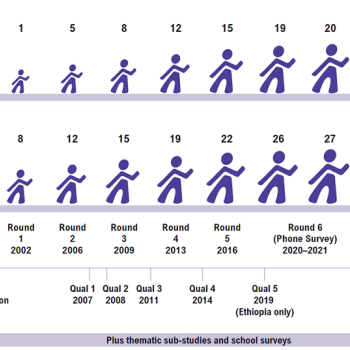
Today, Young Lives will start the seventh survey round of our long-running 4 country study. The first phase involves interviewing approximately 2500 young people across 20 districts in Peru over the course of the next seven months. Data collection will continue later this year in India (Telangana and Andhra Pradesh), Ethiopia and Vietnam with Round 7 fieldwork set to be concluded by March 2024.
Young Lives has followed 12,000 children for over 20 years, in Ethiopia, India, Peru and Vietnam, retaining an incredible 82% of the original 2001 respondents in the study. In two cohorts, the young people are now aged 22 and 29, and so this latest survey focusses on how they are faring in young adulthood, asking questions about physical and mental health, education, work and family formation. We are also introducing an innovative new module to measure cortisol levels – the stress regulating hormone – through the collection of hair samples, to investigate how adverse events such as conflict and climate shocks increases stress.
This seventh survey round will be conducted via in person interviews to go through the detailed questionnaire. In addition, there will be a self-administered component, with participants using tablets to respond in private to questions that might recall distressing events, including the experience of conflict in Ethiopia. In India and Ethiopia an audio version of this self-administered component will be used so participants with poor literacy skills can listen to the questions and answer by touching a shape on screen.
Research findings from Round 7 will be published soon after fieldwork is completed and the data are checked and analysed.
ENDS
For more information contact Julia Tilford on Julia.tilford@qeh.ox.ac.uk
Young Lives produces a comprehensive fieldworker manual, as well as safeguarding guidance for our fieldworkers to ensure that the survey is conducted ethically, safely and with respect for our participants.

Today, Young Lives will start the seventh survey round of our long-running 4 country study. The first phase involves interviewing approximately 2500 young people across 20 districts in Peru over the course of the next seven months. Data collection will continue later this year in India (Telangana and Andhra Pradesh), Ethiopia and Vietnam with Round 7 fieldwork set to be concluded by March 2024.
Young Lives has followed 12,000 children for over 20 years, in Ethiopia, India, Peru and Vietnam, retaining an incredible 82% of the original 2001 respondents in the study. In two cohorts, the young people are now aged 22 and 29, and so this latest survey focusses on how they are faring in young adulthood, asking questions about physical and mental health, education, work and family formation. We are also introducing an innovative new module to measure cortisol levels – the stress regulating hormone – through the collection of hair samples, to investigate how adverse events such as conflict and climate shocks increases stress.
This seventh survey round will be conducted via in person interviews to go through the detailed questionnaire. In addition, there will be a self-administered component, with participants using tablets to respond in private to questions that might recall distressing events, including the experience of conflict in Ethiopia. In India and Ethiopia an audio version of this self-administered component will be used so participants with poor literacy skills can listen to the questions and answer by touching a shape on screen.
Research findings from Round 7 will be published soon after fieldwork is completed and the data are checked and analysed.
ENDS
For more information contact Julia Tilford on Julia.tilford@qeh.ox.ac.uk
Young Lives produces a comprehensive fieldworker manual, as well as safeguarding guidance for our fieldworkers to ensure that the survey is conducted ethically, safely and with respect for our participants.

